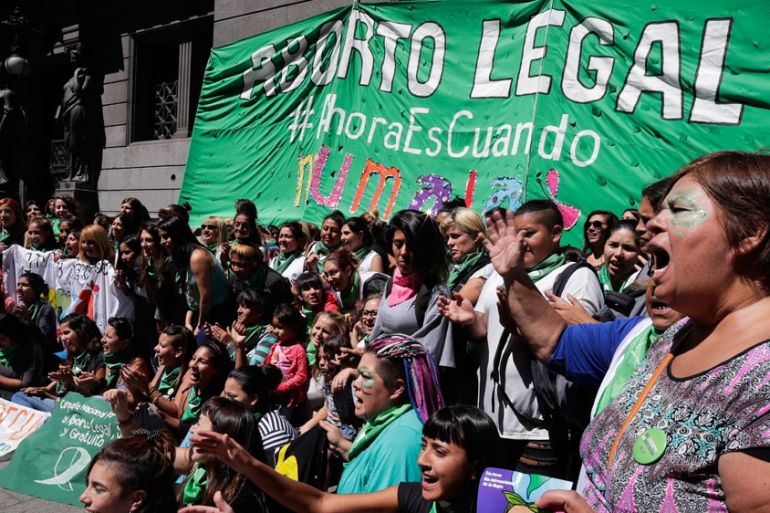‘Historic moment’: Abortion to be debated in Argentina’s Congress
Women’s rights groups cautiously optimistic as more than 70 politicians introduce bill that would legalise abortion.

Women’s rights groups in Argentina are expressing cautious optimism after dozens of politicians introduced legislation that would legalise abortion.
The bill, introduced by more than 70 members of Congress on Tuesday, would allow women to have the procedure during the first 14 weeks of her pregnancy.
Keep reading
list of 4 itemsPoland lawmakers take steps towards liberalising abortion laws
Polish lawmakers debate reforming strict abortion laws
Why has Arizona re-enacted a 160-year-old abortion ban?
Currently, abortion is only allowed in the predominantly Catholic country when the mother’s health is at risk, in cases of rape or if the fetus is extremely deformed.
Activists, holding green handkerchiefs, which has come to symbolise abortion rights in the country, cheered outside Congress in the capital Buenos Aires on Tuesday as the bill was introduced.
“It’s striking what we are achieving in such little time,” said Julia Lopez, who is part of Socorristas En Red, a women’s rights collective of 50 different advocacy groups across Argentina.
![A woman shouts slogans next to a sign that reads 'Legal abortion' during a demonstration on International Women's Day in Buenos Aires [Marcos Brindicci/Reuters]](/wp-content/uploads/2018/03/f4fdc4fe87ca47c5bad58ce27539e263_18.jpeg)
Abortion has been debated at least six times before, but momentum for new legislation has grown since President Mauricio Macri, who has publicly stated he opposes abortion, said he would not stand in the way of the debate.
Pablo Bessone, a professor at la Universidad Nacional de Villa Maria, Cordoba described the number of signatures on Tuesday’s bill as a “record”, adding that previous petitions only received “around 25, 30, 33 signatures”.
‘Public health problem’
According to Bessone, the debate has shifted from focussing on the morality of the issue to framing abortion as a “public health problem”.
Aracelia Ferreyra, who was among the politicians who presented the bill, said on Tuesday, “This is a topic of equality and inequality, because those who do not have money pay with their health or their bodies.”
According to Bessone, “The issue has a lot to do with the unequal social structures that exist, pushing women from the most vulnerable and impoverished sectors towards clandestine abortions.”
He added that “those females who die are the poorest”.
The Argentine government estimates that there are between 370,000 and 522,000 clandestine abortions each year. Rights groups and the World Health Organization say the figure could be much higher. According to the bill, about a third of maternal deaths result from the clandestine procedures, Reuters news agency reported.
Pushback from religious conservatives
But anti-abortion rights campaigners worry that legalising the procedure could increase violence against women.
Maria Rodriguez, a spokeswoman with Frente Joven, a group of young anti-abortion rights activists, said her organisation fears “more men will coerce their partners to abort against their will”.
Pro-abortion rights activists maintain that whether illegal or not “abortion is a practice that exists and will continue to exist”.
“It’s prevalent across the world,” Ruth Zubriggen, another member of Socorristas En Red, said.
The bill could pass the lower house, but according to Bessone, it will face its “main obstacles” in the conservative Senate.
Still, pro-abortion rights activists remain hopeful that enough pressure will be put on politicians to get the legislation passed.
“We feel empowered because it’s an historic moment, which we the feminists have achieved … to put the topic on the agenda to be debated,” Lopez said.